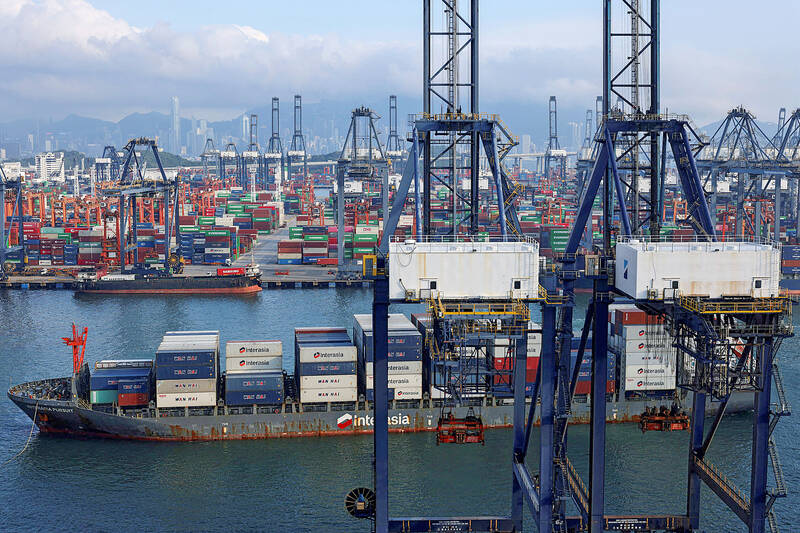Hong Kong authorities ramped up sales of the local dollar as the greenback’s slide threatened the foreign-exchange peg.
The Hong Kong Monetary Authority (HKMA) sold a record HK$60.5 billion (US$7.8 billion) of the city’s currency, according to an alert sent on its Bloomberg page yesterday in Asia, after it tested the upper end of its trading band. That added to the HK$56.1 billion of sales versus the greenback since Friday.
The rapid intervention signals efforts from the city’s authorities to limit the local currency’s moves within its HK$7.75 to HK$7.85 per US dollar trading band.

Photo: Bloomberg
Heavy sales of the local dollar by the HKMA helped dampen Hong Kong’s borrowing rates that were elevated amid demand for the currency to subscribe shares of Contemporary Amperex Technology Co Ltd (寧德時代), which is expected to be the city’s biggest initial public offering (IPO) in years. Lower borrowing costs might also help support Hong Kong’s economy in the face of US tariffs.
The HKMA’s Hong Kong dollar sales “may help buffer potential liquidity tightness at an upcoming IPO, together with other inflows,” said Frances Cheung (張淑嫻), head of FX and rates strategy at Oversea-Chinese Banking Corp (華僑銀行) in Singapore.
The currency peg tends to result in a relatively soft Hong Kong dollar compared with peers in times of greenback weakness, she said.

Photo: Reuters
The Hong Kong dollar’s exchange rate has been on a strengthening bias recently, mainly driven by an increase in market carry-trade activities and equity-related demand for Hong Kong dollars, HKMA chief executive Eddie Yue (余偉文) told lawmakers. The local financial market has operated in an orderly manner, he said.
Demand for Hong Kong dollars in the capital market has been high of late as Chinese investors poured money into Hong Kong stocks this year. Currency conversions related to dividend payments by Chinese companies listed in Hong Kong added to the demand for the local currency.
Before Friday, the last time the HKMA intervened to cap the currency’s gains was in 2020. In comparison, it stepped into the market in 2022 and 2023 to put a floor under the currency when it threatened to breach the weak end of its trading band.
The recent rally in currencies of trade-dependent Asian economies is causing headaches for policymakers. While currency strength can help attract foreign inflows and make imports cheaper, it might hurt exporters by making their goods less competitive globally.
The New Taiwan dollar’s surge by the most in four decades prompted Taiwan’s central bank on Monday to say that it would step into the foreign-exchange market if stability was threatened.
As for the Hong Kong dollar, Citigroup Inc expects HKMA interventions to continue.
“We expect further intervention on the strong side of the trading band given greenback weakness trend may have more room to run,” Citigroup strategist Adrienne Lui (雷智顏) wrote in a note.

NOT JUSTIFIED: The bank’s governor said there would only be a rate cut if inflation falls below 1.5% and economic conditions deteriorate, which have not been detected The central bank yesterday kept its key interest rates unchanged for a fifth consecutive quarter, aligning with market expectations, while slightly lowering its inflation outlook amid signs of cooling price pressures. The move came after the US Federal Reserve held rates steady overnight, despite pressure from US President Donald Trump to cut borrowing costs. Central bank board members unanimously voted to maintain the discount rate at 2 percent, the secured loan rate at 2.375 percent and the overnight lending rate at 4.25 percent. “We consider the policy decision appropriate, although it suggests tightening leaning after factoring in slackening inflation and stable GDP growth,”

DIVIDED VIEWS: Although the Fed agreed on holding rates steady, some officials see no rate cuts for this year, while 10 policymakers foresee two or more cuts There are a lot of unknowns about the outlook for the economy and interest rates, but US Federal Reserve Chair Jerome Powell signaled at least one thing seems certain: Higher prices are coming. Fed policymakers voted unanimously to hold interest rates steady at a range of 4.25 percent to 4.50 percent for a fourth straight meeting on Wednesday, as they await clarity on whether tariffs would leave a one-time or more lasting mark on inflation. Powell said it is still unclear how much of the bill would fall on the shoulders of consumers, but he expects to learn more about tariffs

Greek tourism student Katerina quit within a month of starting work at a five-star hotel in Halkidiki, one of the country’s top destinations, because she said conditions were so dire. Beyond the bad pay, the 22-year-old said that her working and living conditions were “miserable and unacceptable.” Millions holiday in Greece every year, but its vital tourism industry is finding it harder and harder to recruit Greeks to look after them. “I was asked to work in any department of the hotel where there was a need, from service to cleaning,” said Katerina, a tourism and marketing student, who would

i Gasoline and diesel prices at fuel stations are this week to rise NT$0.1 per liter, as tensions in the Middle East pushed crude oil prices higher last week, CPC Corp, Taiwan (台灣中油) and Formosa Petrochemical Corp (台塑石化) said yesterday. International crude oil prices last week rose for the third consecutive week due to an escalating conflict between Israel and Iran, as the market is concerned that the situation in the Middle East might affect crude oil supply, CPC and Formosa said in separate statements. Front-month Brent crude oil futures — the international oil benchmark — rose 3.75 percent to settle at US$77.01